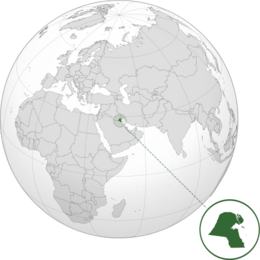More languages
More actions
| State of Kuwait دَوْلَةُ الْكُوَيْت | |
|---|---|
 | |
| Capital | Kuwait City |
| Dominant mode of production | Capitalism |
| Government | Unitary constitutional elective monarchy |
• Emir | Mishal Al-Ahmad Al-Jaber Al-Sabah |
• Crown Prince | Sabah Al-Khalid Al-Sabah |
• Prime Minister | Ahmad Nawaf Al-Ahmad Al-Sabah |
| Area | |
• Total | 17,818 km² |
| Population | |
• 2022 estimate | 4,294,621 |
Kuwait, officially the State of Kuwait is a Western Asian country on the Persian gulf bordered by Iraq and Saudi Arabia.
History[edit | edit source]
Early history[edit | edit source]
In antiquity the territory of Kuwait was a part of several ancient empires such as Babylon, Assyria, Persia and Seleucid. In the middle ages it came under the influence of the Ottoman Empire before becoming a de facto independent Sheikhdom.[1]
Colonial rule[edit | edit source]
The British East India Company began to penetrate the region in the 18th century although it would remain an Ottoman vassal for another century. The British drive into the region contributed to a coup d'état in May 1896 in which Sheikh Muhammad Al-Sabah was assassinated, allowing his brother, Mubarak Al-Sabah, to become the new Sheikh. On January 23, 1899 the British imposed a secret treaty on Mubarak that gave the British exclusive rights in Kuwait, making Kuwait a de facto British protectorate.[1]
Independence[edit | edit source]
On June 19, 1961, Kuwait became an independent country after agreeing to abrogate its previous unequal treaty with the British. In late June the British redeployed troops to Kuwait under the pretext of defending Kuwait from Iraqi territorial claims but removed them again in 1962 under international pressure.[1]
References[edit | edit source]
- ↑ 1.0 1.1 1.2 G. L. Bondarevskii (1979). The Great Soviet Encyclopedia: 'Kuwait; Historical survey'.
'


